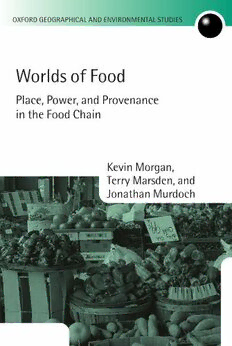
Worlds of Food: Place, Power, and Provenance in the Food Chain PDF
242 Pages·2009·2.157 MB·English
Most books are stored in the elastic cloud where traffic is expensive. For this reason, we have a limit on daily download.
Preview Worlds of Food: Place, Power, and Provenance in the Food Chain
Description:
From farm to fork, the conventional food chain is under enormous pressure to respond to a whole series of new challenges - food scares in rich countries, food security concerns in poor countries, and a burgeoning problem of obesity in all countries. As more and more people demand to know where their food comes from, and how it is produced, issues of place, power, and provenance assume increasing significance for producers, consumers, and regulators, challenging the corporate forces that shape the 'placeless foodscape'. Far from being confined to niche products, questions about the origins of food are also surfacing in the conventional sector, where labelling has become a major political issue. Drawing on theories of multi-level governance, three leading scholars in the field explore the geo-politics of the food chain in different spatial arenas: the World Trade Organization, where free trade principles clash with fair trade concerns in the debate about agricultural reform; the European Union, where producers are under pressure from environmentalists for a more traceable and sustainable food system; and the US, where there is a striking contradiction between the rhetoric of free markets and the reality of a heavily subsidised farming sector. To understand the local impact of these global trends, the authors explore three different regional worlds of food: the traditional world of localised quality in Tuscany, the peripheral world of commodity production in Wales, and the frontier world of agri-business in California.
See more
The list of books you might like
Most books are stored in the elastic cloud where traffic is expensive. For this reason, we have a limit on daily download.
